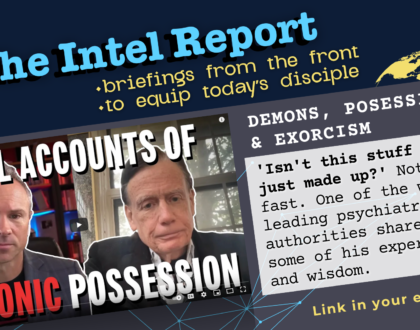Jesus said He came to give us ‘Abundant Life’. What did he mean?

by Westminster
I’m captivated and inspired by Jesus’ words in John 10:10: “The thief comes only to steal and kill and destroy. I came that they may have life and have it abundantly.”
These days there are a lot of people talking about getting the most out of life. “Life is short,” as the expression goes, so make the best of it. Books, TV shows and podcasts are dedicated to helping people get the most out of life. It’s a recognition that we only have a limited amount of time on earth. We don’t know how many days we have, but they’re definitely numbered. We’ve all been to funerals for people we care about. Caskets and tears are a visceral reminder about the shortness of life.
In Tolstoy’s The Death of Ivan Ilych, Ivan realizes he is dying. He’s in his mid-forties. Staring down his own demise, he realizes he has wasted much of his life and even comes to suspect that the people around him have been in his life for their own selfish reasons. Was it all a waste?
Maybe that’s why the phrase “Live your best life now!” has become so popular in our own time. Not only is life short, but we want to give it our best. We don’t want to have the kind of regrets that Tolstoy’s character had. Is that what Jesus was talking about? Is this statement in John 10:10 Jesus’ version of living your best life now?
In various biblical passages, Jesus gives reasons for why he came to the earth. This is one of them. He came that we might have a kind of life which is abundant. The Greek adjective used in this verse is perissos. Note also that the kind of life he offers stands in stark contrast to the work of someone he calls the “thief.” This person or being comes to steal, kill and destroy. Looking at the context, this may be false religious teachers, or even Satan himself.
On a personal note, this verse was the inspiration for a personal that I used on my website for quite some time: “A pulse doesn’t mean you’re alive.” If we’re living we clearly have a pulse. Technically speaking, that makes us “alive.” But if there is such a thing as abundant life, then surely the simple fact of having a heart beat means that there must be something more. Existing isn’t all there is. Otherwise, it would be redundant to talk about some sort of other and higher kind of existence, something Jesus here calls “abundant.”
So what in the world—or out of the world—is abundant life?
To find an answer, I did a study of the word “life” in the Gospel of John in the New Testament. I figured that if I looked at all of the uses of that specific word I might be able to see some common themes. Perhaps these would give me insight about what Jesus meant by abundant life.
The word for life in the Greek text is zoe. It’s where the English name “Zoey” comes from. There are a few other words that are translated from Greek into English as life, but this specific word occurs 36 times. Let’s look at its use. This is going to be a process of distillation—of summarizing, then summarizing some more. At the end, I’ll share what I think is a fair two-word summary of what Jesus means by life that is decidedly abundant.
Let me mention that in the endnotes to the text version of this podcast and blog, I’ll list every single use of the word in John’s Gospel (and put it in bold) for your reference if you want to dig deeper.
Let’s begin.
First, the word “life” often has the word “eternal” before it; the phrases “life” and “eternal life” occur almost interchangeably in John’s Gospel. When Jesus speaks about having life, he certainly means that you will live forever in the glorious presence of God, but he doesn’t only mean that. He is referring to a certain quality of life, not just quantity of life.
The great German theologian and martyr Dietrich Bonhoeffer was confident in eternal life. His time on earth was very faithful and well-used. It had quality. But when that time on earth ended, he didn’t end. His final words before his execution were: “This is the end. For me, the beginning of life.”
More about this idea as we proceed.
Second, here is the summary of the 36 uses of this specific word. I’ve put them into eight initial categories.
1. Life itself is in God the Father and in God the Son, meaning Jesus (5:26)
2. The life that is in Jesus is the light of all people. Here, light is a metaphor for God’s presence and illuminating wisdom (1:4; 6:27; 6:68-69; 8:12).
3. Eternal life is defined as knowing God the Father and Jesus Christ (17:1-3). Keep in mind that in John’s Gospel, ‘knowing’ often serves as a synonym for ‘believing in’ or ‘receiving’ Jesus.
4. Life and eternal life are received by trusting in Jesus. Trusting in him isn’t a vague sentiment. It means much more than acknowledging he existed or was a nice person or teacher. It means trusting or believing in certain things, such as (a) who he is as the long-awaited Jewish Messiah and as God’s Son, (b) what he has done for us on the cross (i.e. dying for others and in our place), and (c) living differently and obediently as a result. (3:14-15; 3:16; 3:36; 5:24; 5:28-29; 6:40; 6:47; 10:28; 11:25-26; 12:25; 12:50; 14:6). Clearly, this is the largest category of statements about what it is to have life.
When he was forty-five years old, English Reformer John Bradford was facing execution for his faith at the hands of Queen Mary, whom history has remembered as “bloody Mary.” He was to be tied to the stake and burned to death. In the moments before the flames began to dance at his feet, he turned to his fellow martyr, John Leaf, and said: “Be of good comfort, brother; for we shall have a merry supper with the Lord this night.”[1] That, my friends, is a genuine trust in who Jesus is and what he has done. He lived differently and obediently as a result. He was assured of life, and of eternal life, even as the flames consumed his body.
5. God’s wrath is the consequence for those who don’t believe in him (3:36). That’s significant and heavy. At that verse we need to pause and ponder.
A story is told by Max Lucado about a woman who had lived her whole life disrespecting God. On her deathbed, in her final hours on earth, she would not let anyone utter a word about God or eternity. As Lucado tells the story he takes a humble posture, saying that no one knows her final thoughts and it is not our job to judge. But a few hours from her death in a weakened state, she opened her eyes, and speaking to face that was only visible to her, she said: “You don’t know me? You don’t know me?”[2]
6. Jesus himself is our ultimate source of nourishment and satisfaction as the “bread of life” (6:33; 6:35; 6:48; 6:51; 6:53; 6:54).
7. Life is having Jesus’ life-giving water within you; this is a way of speaking about having the Holy Spirit within you (4:13-14, as per 7:37-39; 6:63).
8. Having life in Jesus’ name, and believing in him, is the purpose of the Gospel of John (20:30-31).
Those are the eight main categories. As a reminder, we’re looking for a cumulative weight and usage of the word “life” throughout John’s Gospel.
Let’s distill what we’ve learned into six further headings. I’ve changed the order for reasons that will become clear in a moment.
1. Knowing and trusting in God through Christ.
2. Being assured of eternal life.
3. Finding in Christ our ultimate nourishment and satisfaction.
4. Navigating life with his illuminating wisdom.
5. Living differently than others because of who Jesus is and what he has done for us on the cross.
6. Cooperating with the Holy Spirit who is working in and through you.
So if I were to summarize these six points with two words—and this is where we land with our process of distillation—they would be peace and purpose.
Peace and purpose. Jesus means much more than this when he speaks about having abundant life, of course. If we truly want to appreciate the scope of abundant life we need to keep all of his words in mind, not just two of them. But we can think of these two words kind of like handles which we can carry around with us, reminding us of that greater meaning. Just as a suitcase can remind you about everything you plan to do on a much-anticipated vacation, these two words can remind you about much of what is meant by abundant life. Let me explain further.
The first three sentences on that list of six, among other things, speak to having peace with God. It is the peace of knowing him and of forgiveness; it is the peace of being confident that you will live forever with him; it is the peace that comes from being in relationship with the ultimate source of nourishment and satisfaction of earth—this is Jesus as the ‘bread of life.’
The second three on that list above are about having purpose. You have purpose when you navigate life with the wisdom of God, and to not only benefit from that wisdom yourself, but share it with others. You have purpose when you live in a unique way because of who Jesus is and because of what he has done for us on the cross. This is the furthest thing from blending in with the crowd. In an act of self-sacrificial love, Jesus gave his life for you and me. A significant part of how we live is to emulate Jesus’ own servanthood for the benefit of others. He tells his followers to do so in John 13 and elsewhere.
Further, you have purpose when you cooperate with the Holy Spirit who is working in and through you. You have been given special “spiritual gifts” that will glorify God, build up his church, and bless others. In addition, the Holy Spirit grows godly character in you and which will be a blessing to others. This is the famous “fruit of the Spirit” listed in Galatians 5:22-23: love, joy, peace, patience, kindness, goodness, faithfulness, gentleness, and self-control. Both spiritual gifts and fruit of the Spirit are ways God works in and through you. When you cooperate with that work you are personally participating in the ways Jesus is bringing heaven to earth.
You are also becoming more like him. In addition to this Gospel, John also wrote some letters which are preserved later on in the New Testament. In the first of those letters (chapter 2, verse 6) he says: “whoever says he abides in [Jesus] ought to walk [live] in the same way in which he walked.” Yes, the Holy Spirit grows Christlike character in his people.
I realize that Jesus says more things about life in the other Gospels. But I think this is one helpful way to summarize what he means by having abundant life: Peace with God and purpose in God.
This is very good news. We live in a world where peace often seems like a distant dream—not only for the world generally, but for us specifically. We have our own stresses and messes. We have anxieties and fears. Then we turn on the news or go online and find that things seem to be getting worse. It’s easy to get carried away in the craziness.
In this country, one in four are “very stressed” at work. One in eight families struggle to put food on the table. 15-25% of people under nineteen experience mental health issues or illness. All of these numbers were from before the Covid-19 pandemic. Can you imagine how much higher they would be today? And that’s just the tip of the iceberg. You know your battles best.
To all of Jesus offers peace. In fact, he is called the “prince of peace” in a prophecy in Isaiah 9:6. Come near to him and he will come near to you, as per James 4:8.
And then there’s purpose.
A few years ago a front page article in the New York Times titled “U.S. Suicide Rate Surges to 30-Year High,” highlighted the sobering fact that overall suicides rose twenty-four percent between 1999 to 2014. The increase in the last eight years was double that of the first seven, which means it’s getting worse, faster. The suicide rate tripled for girls ages ten to fourteen, and rose in almost every other racial and gender category.
Various people tried to explain it. Some said it must be due to economic factors or low job prospects. But not a single person mentioned faith or God. Only one, Harvard professor Robert Putnam, mentioned the word “hopelessness.”
In an interview, Sophia Loren said she had so much, including awards and marriage. But “in my life there is an emptiness that is impossible to fulfill.” Can you relate? If so, it doesn’t need to be that way.
People long for purpose. They ask: Is there any greater meaning to life? Will my life make a difference? Am I here on earth for a reason?
Remember Tolstoy’s character named Ivan? Well, Tolstoy himself came to the point of pondering the same sorts of questions. He wrote: “Is there any meaning in my life that the inevitable death awaiting me does not destroy?”
If you are in Christ, the answer is a resounding Yes. You were made on purpose and for a purpose. Imagine cooperating with God’s will in the world? Imagine being salt and light? In Christ, that’s you. You can’t always see the end result. But God can.
Jesus said: “I came that they may have life and have it abundantly.” Peace with God and purpose in God.
Praise be to One who makes all things new. A pulse doesn’t mean you’re alive. But Jesus does.
Recommended Posts

10 Unpopular things Jesus said
July 23, 2024

The Intel Report No.2 – Demons, Possession & Exorcism
July 17, 2024
